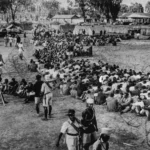Kwa angalau karne tatu, Ufalme wa Dahomey ulikuwa mamlaka kuu ya Afrika Magharibi kulinganishwa na Sparta. Wageni wa Uropa walizungumza juu ya wapiganaji wake wa kike: Yeye-askari. Medusas. Wapiganaji wa Spinster.
Neno ambalo limekwama katika Benin ya kisasa: Amazons.
“Hata iwe ingekuwaje ustadi wa Waamazon miongoni mwa watu wa kale, hilo ni jambo geni katika historia ya kisasa,” akaandika Archibald Dalzel, msimamizi Mwingereza katika eneo hilo, mwaka wa 1793.
Afisa wa Ufaransa baadaye aliitaja Dahomey kama "nchi pekee ulimwenguni ambayo inatoa tamasha kubwa la shirika la askari wa kike", kulingana na mwandishi wa habari wa Marekani Stanley Alpern. Mchapishaji wa Kifaransa Larousse alitangaza wanawake "Amazon pekee wanaojulikana kihistoria".
Katikati ya karne ya 19, Dahomey ilijivunia maelfu ya wanajeshi wa kike ilipojaribu kushinda majimbo hasimu. Wakati mapigano yalipozuka, washindi walijulikana kuwalazimisha adui zao kazini au kuwauza katika biashara ya utumwa.
Amazoni walianza mazoezi katika utoto wao wa kike: visu za kubembea, kupakia miskiti ya Flintlock na kupanda vizuizi vya miiba. Walikunywa pombe kali kutoka nje na kuimba nyimbo za vita.
Tamaduni hiyo iliisha wakati Ufaransa ilipovamia. Mbele ya kushindwa, aliandika jenerali wa Kifaransa, "wanawake walionyesha ushujaa mkubwa sana,".
Takriban Amazon 2,000 walikufa katika mauaji hayo, wanahistoria wanakadiria, na manusura 50 walififia na kuwa taifa lililobadilishwa. Baadhi yao bado ni Abomey, mji mkuu wa zamani wa ufalme huo.
Jozi ya mafundi katika jumba lililojengwa upya la Mfalme Glele - kila mmoja wa wafalme 12 wa Dahomey walijenga kasri lao - walishona mabango ya Amazoni kwa bunduki, kupigana na wanaume na kushikilia vichwa vilivyokatwa.
Ishara yenye kutu mjini inafahamisha umma kwamba kanisa Katoliki sasa linamiliki eneo la kambi ya zamani ya Amazon. Rangi hiyo inatoka kwenye sebule ya shujaa wa kike katika kijiji jirani.
Machapisho yanayohusiana
-
Nigeria Yaagiza Kiwanda cha Kusafisha cha Dangote
Rais wa Nigeria Muhammadu Buhari ataagiza kiwanda cha kusafisha mafuta cha Dangote chenye mabilioni ya dola ndani ya wiki mbili,…
-
Luka wa Kahangara: Chifu Katika Moyo wa Mauaji ya Lari
Katika nyanda za juu zenye ukungu za Kati mwa Kenya, miaka ya mapema ya 1950 ilikuwa miaka ya njaa ya ardhi,…
-
Wakenya 500 Waondolewa kwenye Orodha ya Utajiri
Wakenya mia tano waliondolewa katika orodha ya kipekee ya mamilionea wa dola mnamo 2023. Hii…


